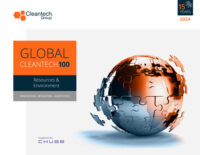Protein Production Methods and Carbon Capture in Agricultural Soils – New Insight from Cleantech Forum Europe
Two key topics: gas fermentation to produce proteins for feed and food, and how to measure, manage, and monetize carbon capture in agricultural soils emerged at Cleantech Forum during sessions with leading innovators, investors and corporations too. Here are some key takeaways.
Carbon capture in soils: measure, manage, monetize
To discuss this topic we invited three innovators, Andrew Vosey, Head of Sales and Carbon, Soil Capital, Phillip Gehlen, EU Business Development Manager, Biome Makers and Annie Leeson, CEO, Agricarbon, alongside investor Pieter Vis, Investment Manager, Pymwymic.
General scientific agreement is 2-5GT of CO2 could be sequestered globally by applying practices that improve carbon sequestration. Compare this to the 400 million tonnes global capacity that CCUS strategies could employ and the scale of this opportunity is clear. This total could be higher if you include increased adoption of other technologies such as biochar, deep rooted crop types and microbial crop inputs. The co-benefits also include ecosystem services such as flood defence and biodiversity. However, quality data is king. “Investment decision in this sector will only be made using robust, independently gathered, decision-grade data that is specific to each farm from direct measurement.” Annie Leeson – Agricarbon
Building a market requires robust verified markets
Andrew Vosey from Soil Capital talked about the need to build a robust tool to quantify the amount of carbon that a farm sequesters. To incentivise uptake, the company compared farmers to their neighbours. In year one, 800 farmers applied to take part and 150 were onboarded. 15,000 tonnes have been sequestered so far, and at launch 500,000 tonnes of certificates had been sold to key corporate buyers. These certificates have been verified by third parties, alongside core development of their proprietary tool.
The key challenge is “how to be the experts at bringing together large groups of farmers that corporates can fund in a low friction way. For farmers, there is an awful lot of education required to overcome long-established scepticism of carbon markets targeted at farmers.” Andrew Vosey – Soil Capital.
Protein production using gas fermentation
To discuss this topic we invited two innovators, Ezhil Subbian, CEO, String Bio, and Peter Rowe, CEO & Co-Founder, Deep Branch, alongside two speakers from corporations in this industry, Patrick Campbell, VP Salmon Division, BioMar and Erik Tveteraas, Investment Director, Nutreco.
Innovators in this sector are converting methane and carbon dioxide into proteins for animal feed markets, particularly in aquaculture. Conversion of gas is replacing more traditional fermentation feedstocks such as sugar to reduce the resource-intensity of the feedstock and offer flexibility to customers.
Sustainability credentials
The emissions intensity of conventional protein sources is so significant that displacing soy or wild-caught fishmeal has a far larger impact of system-wide emissions intensity than the act of using greenhouses gases as a feedstock. Pete Rowe from Deep Branch quoted a 90% reduction is carbon footprint for it’s production pilot with Drax, when compared to agricultural- and aquacultural-based feeds.
Gas fermentation as a technology is not resource-limited and therefore a geographically flexible method of protein production. Given the typically disparate nature of agricultural supply chains this is beneficial. The cost of transportation for bulk protein accounts for a large portion of total costs, making flexible decentralised production appealing.
For an aquaculture company like BioMar, more flexible protein production methods are required to see sustainable growth in a market set to double in production volume by 2050. Currently, 80% of the carbon intensity of salmon is in the feed. These scope 3 emissions are a key target for BioMar and they expect to work with gas conversion and multiple other new protein production methods.
Keep an eye on…
Investors and corporates are looking for ways to engage with this market. Pieter Vis from impact investor Pymwymic explained that their interest in four main pillars: food security, nature-positive food systems, safe and healthy diets, and socio-economic impacts for farmers. With their new Healthy Food Systems Fund, which looks to tackle these four pillars, it is interesting to note that their first investment was Biome Makers, a soil analytics innovator.
Philip Gehlen from Biome Makers explained their business model has two key parts. Firstly, BeCrop, a tool for farmers and agronomists that offers in-depth soil testing and analysis. Secondly, Gheom provides an assessment of a biological crop input to give an independent view on the functional claims made by crop inputs. A new product being launched soon is the Sustainability Index Rate which will assess the network capabilities of soil microbes, and make the link between farm practice and microbial interactions. This new certification offers a way to track improved sustainability of soils over time, and will be valuable to food companies setting sustainability KPIs.



